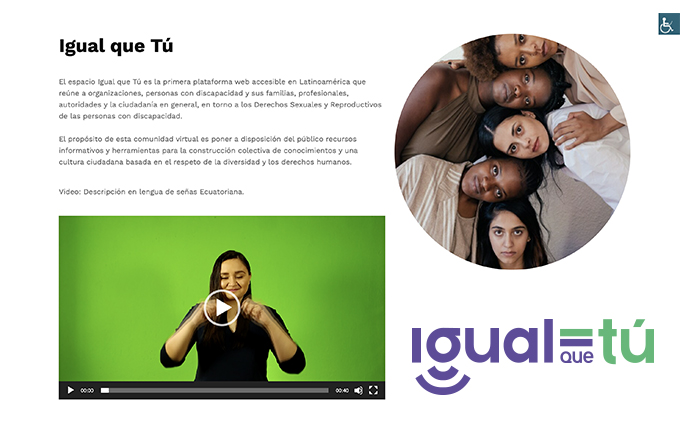Most websites in the world are not accessible to people with disabilities. It is estimated that 90% of them are not inclusive. The covid-19 pandemic has exposed this reality and has aggravated the problem of access to information. With the events and other face-to-face spaces for personal exchange canceled, young people and adolescents with disabilities face a great obstacle when looking for accessible virtual spaces to interact with each other, and to access information that allows them to know about their sexual and reproductive rights and a life free from gender-based violence. For this reason, with the technical support of the United Nations Population Fund (UNFPA) in Ecuador, the Spanish Agency for International Development Cooperation (AECID), and civil society organizations that work with people with disabilities, decided to create Igual que tú, an accessible website that seeks to become an informative space, for meeting and exchanging youth experiences.
Marcia Elena Álvarez says that the construction of this website reflects the articulated work of UNFPA with various civil society organizations and that its main objective is to strengthen leadership, participation, access to information and exchange of experiences, under conditions of equality for adolescents and young people with and without disabilities. Álvarez explains that the name Igual que tú, was created in a participatory way with young people with and without disabilities and was selected because it gives meaning to inclusion.
Igual que tú will be a safe space in which young people with different types of disabilities living in Ecuador will be able to interact with each other and create a support network. Leonie Werner, coordinator of the We Decide project of UNFPA Ecuador, also explains that through the platform Igual que tú, adolescents and young people can connect, exchange ideas, and acquire knowledge related to the issue of sexual and reproductive rights and a life free of gender-based violence.

“Accessibility is necessary for some, but it is useful for everyone,” says Sebastian Flores, co-founder of Fundación Comparlante — an organization that promotes accessibility and equal opportunities for people with disabilities in Latin America through technological tools. Flores has low vision and says that throughout his life he has encountered barriers to surfing the Internet “many times”. However, he believes that technology can be used to remove those obstacles and create a more accessible world. For this reason, with the support of UNFPA-AECID, Sebastian and other organizations developed Igual que tú.
Flores says that he is “absolutely happy” to be able to carry out this project that has a positive impact not only for people with disabilities, but also for citizens in general. The 31-year-old man explains that in order to be accessible, the page is designed under web accessibility parameters such as image description (when the cursor is passed over the image, text-to-speech programs can read what the content for the blind or visually impaired), adaptable colors and contrasts (when the background color of the web is changed to facilitate the readability of the texts), Ecuadorian Sign Language, simple language (that is, use easy words to that people with intellectual disabilities, people who do not handle Spanish well, and people who do not understand certain concepts well can understand the information more easily), screen readers (who read the content within a website for blind or visually impaired people) , and navigation controls (which are like a special cursor for people with motor disabilities). In general, Flores assures that it is a site designed from the perspective of universal accessibility. In other words, it is accessible to everyone, and not just to people with some form of disability.
Igual que tú will host informative and educational content on issues of identity, inclusion, human rights, sexual and reproductive rights, and gender equality. The materials in Ecuadorian Sign Language were adapted and created by Francesca Cicenia, president of the Súmate por la Equidad Foundation, which is also committed to inclusion and accessibility for people with disabilities in Ecuador— highlighting the voices of women and young people with disabilities or caregivers of people with disabilities in the country.
Other contents on the website will include educational tools, positive messages, and strategies to promote the rights of people with disabilities. Werner says the page is an opportunity to learn more about organizations that support people with disabilities. As well as a space to suggest new content and establish contact between young people and women.
Igual que tú is also designed to strengthen a network of youth and women, organizations, and activists working for the rights of people with disabilities. Leonie Werner says she hopes that once the local network is consolidated, alliances can be established with regional networks, such as the We are All In Action Movement (META). To prepare for the launch of the website, Fundación Súmate por la Equidad and META with the support of Fundación Comparlante and UNFPA organized a workshop with 30 youth and women from Ecuador and the META network. This first approach between members of organizations of people with disabilities served to reflect on the sexual and reproductive rights of young people and women with disabilities and facilitate the use of the website.
Matías Ferreyra is from Argentina and the regional coordinator of META. He explains that the movement is made up of around one hundred young people from different Latin American countries who want to promote the rights of people with disabilities. The 33-year-old believes that having a regional space like META has been important because it has helped to make visible the reality of people with disabilities in the region. Ferreyra, who is visually impaired, believes that Igual que tú is a great project. “I think it fulfills a very specific need that exists in Ecuador and I hope that it can grow a lot more,” he says. Sebastian Flores, from Fundación Comparlante, is just as excited as the young Argentine and hopes this will be the first of many 100% accessible websites in Ecuador.


